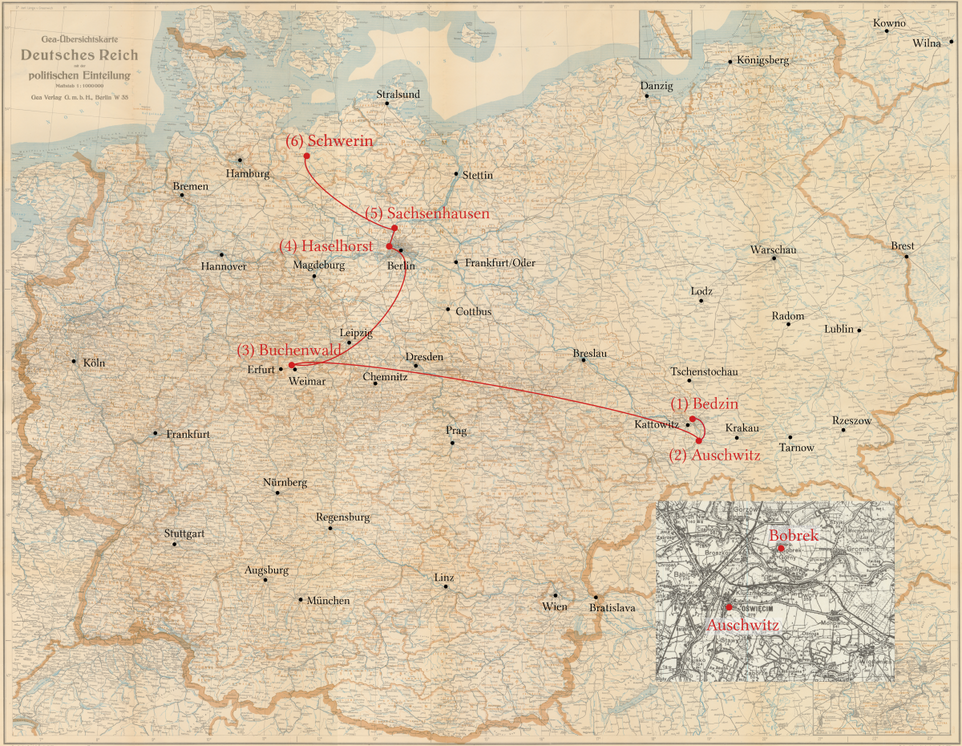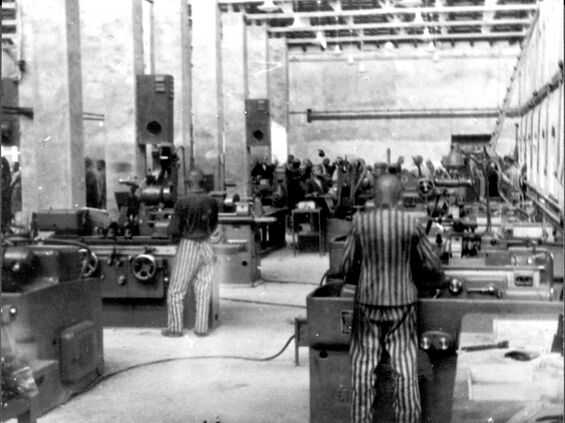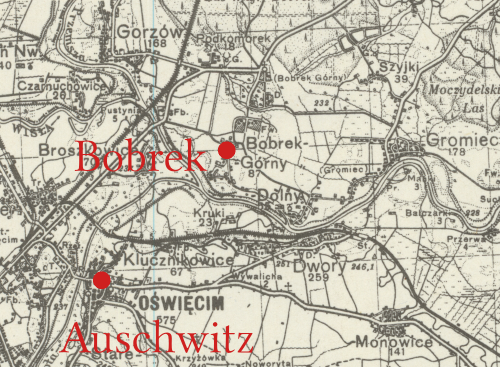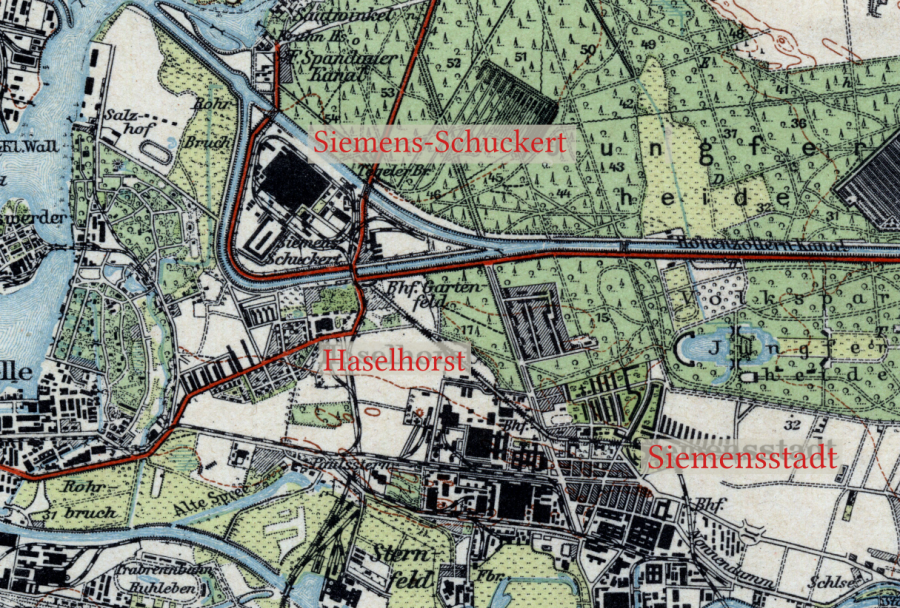The Biography of Boris Piekny, Bedzin
Short biography and stations of his persecution
- born on 8 December 1910 in Bedzin/Poland
- 1940 to August 1943 Bedzin ghetto,
- August 1943 to January 1944 Auschwitz-Birkenau concentration camp, quarantine,
- January 1944 to May or June or 1944 Auschwitz-Birkenau concentration camp,
- May or June 1944 to January 1945 Auschwitz concentration camp/Bobrek sub camp
- January 1945 to February 1945 Buchenwald concentration camp,
- February 1945 to March 1945 Sachsenhausen/Haselhorst concentration camp,
- March 1945 to April 1945 Sachsenhausen concentration camp
- USA
He was 29 years old at the beginning of his persecution.
Ghetto Bedzin
When the war broke out in 1939, I was living in Bedzin, Poland. In 1940, the Germans forced us to move to the Bedzin ghetto, where I lived with my wife. I had to work as an electrician in a construction unit for the German Wehrmacht. My wife was employed as a seamstress in a tailor's workshop. We were not allowed to leave the ghetto, but as my work was outside, I had to have a special pass that only allowed me to leave and re-enter the ghetto at certain times.
On 22 June 1943, my wife and many others were selected for the Auschwitz concentration camp and transported there. The selection took place in a square in the ghetto, where all the inhabitants of the ghetto had been rounded up. This action was supervised by SS-Obersturmfuehrer Dreier.
Source: Boris Piekny, Affidavit. 1955, State Archives of Lower Saxony, Nds. 110 W Acc. 14/99 No. 104005
| Ghetto | |
|---|---|
| Location | Będzin / Bendsburg |
| Area | Prussia (Province of Upper Silesia) (1939-1945) |
| Opening | 01 July 1940 |
| Liquidation | 02 August 1943 |
| Deportations | From Bedzin, 5,000 Jews were deported to Auschwitz in August 1942 and a further 2,500 people in June 1943. At the beginning of August 1943, a total of 8,000 Jews were deported to Auschwitz in four transports. On 17 December 1943 and 13 January 1944, two further transports arrived in Auschwitz with a total of 2,800 Jews from Bedzin and Sosnowiec. |
| Source: deutschland-ein-denkmal.de | |
Auschwitz concentration camp
On 31 July 1943, the remaining ghetto inhabitants were transported away. A five-day railway journey took us to Auschwitz, where another selection took place as soon as we arrived. Some of us were sent to the gas chambers, others to a quarantine camp where we were given prisoners' clothing. They tattooed the prisoner number 132937 on my left arm. We were often mistreated there, e.g. a camp captain knocked out several of my teeth.
On 13 January 1944, I was transferred from the quarantine camp to a labour camp at Auschwitz concentration camp, where I had to work as an electrician for the Siemens company. I lived in Block 11 and first had to help build a factory and later, after its completion, work there as an electrician.
During the construction of the factory I lived in the Birkenau camp, from where we were transported by lorry every morning to the factory, which was about 6-8 km away. Later we lived in a camp right next to the factory.
Source: Boris Piekny, Affidavit. 1955, State Archives of Lower Saxony, Nds. 110 W Acc. 14/99 No. 104005
Boris Piekny testified as a witness in the Frankfurt Auschwitz Trial, here is an excerpt:
Vorsitzender Richter: Ist es vorgekommen, daß in Ihrer Gegenwart von dem Angeklagten Bednarek Leute mißhandelt worden sind?
Dolmetscher Schuh: Did it happen that in your presence people were maltreated by the accused Bednarek?
Zeuge Boris Piękny: Yes.
Dolmetscher Schuh: Ja.
Vorsitzender Richter: Wollen Sie uns diese Fälle einmal schildern.
Dolmetscher Schuh: Would you please relate to us those incidents.
Zeuge Boris Piękny: Well, it's very painful for me to start all over again to revive the whole story.
Dolmetscher Schuh: Es ist sehr schmerzlich für mich, diese ganze Geschichte wieder zu erzählen.
Zeuge Boris Piękny: But since I decided already to be a witness I'll have to go through with it.
Dolmetscher Schuh: Aber da ich mich schon entschlossen habe, ein Zeuge zu sein, so muß ich es auch durchstehen.
Zeuge Boris Piękny: Ich möchte gerne in Deutsch, aber ich weiß nicht, ob ich das können werde. — I prefer English.
Dolmetscher Schuh: Ich ziehe es in Englisch vor.
Zeuge Boris Piękny: Yes. Well, it was on a Sunday.
Dolmetscher Schuh: Also es war an einem Sonntag.
Zeuge Boris Piękny: And Bednarek ordered to bring logs of wood from trees from the back of the camp to bloc 11.
Dolmetscher Schuh: Bednarek sagte, daß wir Holzklötze von Bäumen hinten vom Lager nach Block 11 bringen sollten.
Zeuge Boris Piękny: And he ordered myself and somebody else there, a fellow by the name of Händel, to carry such a log.
Dolmetscher Schuh: Und er befahl mir und einem anderen Mann namens Händel, ein solches Stück zu tragen.
Zeuge Boris Piękny: Then we hardly could get to the bloc, we struggled but we got it to the bloc. I am not built strong. And that other fellow was still of weaker build.
Dolmetscher Schuh: Wir konnten es kaum zu dem Block bringen. Ich war schwach. Aber wir haben uns durchgekämpft. Und ich bin schon schwach, aber der andere Mann war noch schwächer gebaut.
Zeuge Boris Piękny: Then we went for a second one.
Dolmetscher Schuh: Dann gingen wir um einen zweiten.
Zeuge Boris Piękny: When it came to the second one, we didn't do quite well. We couldn't pick it up. It was very hard to pick up.
Dolmetscher Schuh: Und als wir an den zweiten kamen, da haben wir es nicht so gut getan. Wir konnten ihn nicht aufheben. Er war sehr schwer.
Zeuge Boris Piękny: There was Bednarek right beside us. And hestarted beating.
Dolmetscher Schuh: Da war Bednarek direkt neben uns. Und er fing an zu schlagen.
Zeuge Boris Piękny: So we couldn't help ourselves. We had to – with the last strength to pick that up. And we could hardly walk with it. And I kept down saying to my fellow: »Please get a hold of yourself and let's go, because he is right behind us with a stick. And he will probably kill one of us. So let's go, let's do it.«
Dolmetscher Schuh: Und da haben wir doch unsere schwachen Kräfte zusammengenommen und haben den Block hochgehoben. Und ich habe zu meinem Mann gesagt: »Nimm dich zusammen. Geh, er ist direkt hinter uns mit dem Stock. Und wenn wir [+ es] nicht machen, wird er einen von uns totschlagen.«
Zeuge Boris Piękny: We went a few feet, I'd say. And I saw, that the one in front of me, that other fellow, he just couldn't. He dragged, he was going to fall with the log and drag me down too. And I kept on saying to him: »Don't do it, don't do it. Hold on to yourself.« And finally he collapsed, he fell. The log fell down and with me. And in faith from what I know that I was beaten up. And then he beat up also the fellow in front of me
Vorsitzender Richter [unterbricht]: No, no. Stop. Moment.
Zeuge Boris Piękny: And he fell down.
Dolmetscher Schuh: Und ich habe gesehen, wie der Mann vor mir nicht mehr konnte. Und ich habe gesagt: »Mach, mach!« Aber er ist dann zusammengebrochen, und wir sind gefallen. Und dann, was ich weiß, hat er ihn geschlagen und mich geschlagen.
Zeuge Boris Piękny: Then we couldn't pick it up any more.
Dolmetscher Schuh: Wir konnten es nicht mehr aufheben.
Zeuge Boris Piękny: So Bednarek ordered somebody else to pick that log up and us
Dolmetscher Schuh: Also befahl Bednarek irgend jemand anderem, diesen Klotz aufzuheben.
Zeuge Boris Piękny: And me he ordered
Vorsitzender Richter [unterbricht]: Langsam.
Zeuge Boris Piękny: To pick him up and bring him to the block.
Dolmetscher Schuh: Und mir befahl er, ihn aufzuheben und nach dem Block zu bringen.
Zeuge Boris Piękny: Ja. When we came to the block, then it was terrible.
Dolmetscher Schuh: Und als wir zum Block kamen, dann war es schrecklich.
Zeuge Boris Piękny: He said to me I should bend over that stove we had in the block, there was from bricks a stove the whole length of the block.
Dolmetscher Schuh: Er sagte zu mir, ich sollte mich dort über den Ofen bücken. Wir hatten dort einen Ofen über die ganze Länge des Blocks.
Zeuge Boris Piękny: Well, I bent down.
Dolmetscher Schuh: Und ich habe mich gebückt.
Zeuge Boris Piękny: And then I saw only black in front of my eyes.
Dolmetscher Schuh: Und dann sah ich nur noch schwarz vor den Augen.
Zeuge Boris Piękny: I don't know how many times he beat me.
Dolmetscher Schuh: Ich weiß nicht, wie oft er mich geschlagen hat.
Zeuge Boris Piękny: One thing I do know, that for several weeks I couldn't sit.
Dolmetscher Schuh: Aber eines weiß ich, daß ich einige Wochen nicht sitzen konnte.
Zeuge Boris Piękny: And I couldn't, I beg your pardon, have my physical duties. Everything was hurting. I was bleeding.
Dolmetscher Schuh: Und ich konnte nicht, entschuldigen Sie mich, meine körperlichen Bedürfnisse befriedigen. Alles hat geblutet.
Zeuge Boris Piękny: Alles hat geblutet. — That's right.
Vorsitzender Richter: Und der andere?
Zeuge Boris Piękny: Und der andere hat noch viel mehr bekommen. — He told me later that he thinks that his kidneys were chopped up.
Dolmetscher Schuh: Er sagte mir später, daß seine Nieren zerschlagen wären.
Zeuge Boris Piękny: And a few days later he died. He didn't want to go to the Krankenbau because there was a doctor in Krankenbau – I don't really know the name, cause I never saw him and I did never heard his name – who helped the unuseful to the gas chamber. So he didn't want to go.
Dolmetscher Schuh: Und einige Tage später ist er gestorben. Er wollte nicht nach dem Krankenblock gehen. Weil dort war ein Arzt, von dem er wußte, daß er die Leute nach der Gaskammer schicken würde.
Zeuge Boris Piękny: He finally did go to the Krankenbau.
Dolmetscher Schuh: Er ist schließlich zum Krankenbau gegangen.
Zeuge Boris Piękny: But he never came back.
Dolmetscher Schuh: Aber er ist niemals zurückgekommen.
Zeuge Boris Piękny: He died. I don't know where he died. He died on that Krankenbau or he died somewhere else. But he never came back. He died.
Dolmetscher Schuh: Er ist gestorben. Ich weiß nicht, wo er gestorben ist, entweder im Krankenbau oder irgendwo anders. Aber er ist niemals zurückgekommen. Er ist gestorben.
Vorsitzender Richter: Sagten Sie nicht eben, er wollte nicht nach dem Krankenbau gehen, weil er fürchtete, dort ins Gas geschickt zu werden?
Dolmetscher Schuh: Didn't you just say, that he was afraid to go to the
Zeuge Boris Piękny [unterbricht]: Yes, this was the rumours, this was the rumours were
Dolmetscher Schuh [unterbricht]: Let me finish please.
Zeuge Boris Piękny: Yes.
Dolmetscher Schuh: Didn't you just say, that he didn't want to go the dispensary, because he would be send into the gas?
Zeuge Boris Piękny: Because unuseful men were sent to the gas.
Dolmetscher Schuh: Ja, weil unbrauchbare Männer wurden in das Gas geschickt.
Vorsitzender Richter: Und trotzdem ist er hingegangen?
Dolmetscher Schuh: And despite that fact he went there?
Zeuge Boris Piękny: Yes, because he couldn't go to work any more. Then he had to go.
Dolmetscher Schuh: Ja, weil er nicht mehr zur Arbeit gehen konnte, und er mußte gehen.
Vorsitzender Richter: Und dieser Mann hieß Händel?
Witness Boris Piękny, 150th day of trial 22 April 1965, 1st Frankfurt Auschwitz Trial, "Criminal case against Mulka and others", 4 Ks 2/63 Frankfurt am Main Regional Court
Auschwitz/Bobrek
During the construction of the factory, I lived in the Birkenau camp, from where we were transported by lorry every morning to the factory, which was about 6-8 km away. Later we lived in a camp right next to the factory.
Source: Boris Piekny, Affidavit. 1955, State Archives of Lower Saxony, Nds. 110 W Acc. 14/99 No. 104005
| Subcamps of the Auschwitz concentration camp | |
|---|---|
| Location | Bobrek k. Oświęcimia |
| Territory | Prussia (Province of Upper Silesia) 1939-1945 |
| Opening | 22 April 1944 (first mention) |
| Closing | On 19 January 1945: "Evacuation" to the Gleiwitz II satellite camp |
| Prisons | 213 prisoners on 17 January 1945 |
| Gender | Men |
| Employment of the prisoners at | Siemens-Schuckert Werke AG |
| Type of work | The prisoners were deployed from December 1943, working in the factory on the production of electrical equipment for aeroplanes and submarines |
| Source: deutschland-ein-denkmal.de | |
Buchenwald, Haselhorst, Sachsenhausen
In January 1945, we were transported by railway to Buchenwald, where I did not work. At the beginning of February 1945, if I remember correctly, on 10 February 1945, I was taken to Haselhorst near Berlin, where I also had to work at Siemens in Berlin-Siemensstadt until the camp was destroyed by bombing in March 1945. We were then transported to Sachsenhausen, where I was in March 1945 until 20 April 1945. Then we were put on the march because the Russians were approaching. Without food and with very little sleep, we travelled for weeks, always on foot. I was liberated in a forest near the town of Schwerin in Mecklenburg on 2 May 1945.
Source: Boris Piekny, Affidavit. 1955, State Archives of Lower Saxony, Nds. 110 W Acc. 14/99 No. 104005
| Subcamps of the Sachsenhausen concentration camp | |
|---|---|
| Location | Berlin-Haselhorst (Siemensstadt) |
| Area | Prussia (City of Berlin) |
| Opening | 17 July 1944 |
| Closing | "Evacuation" on 10 April 1945 to Sachsenhausen |
| Prisons | About 1,400 prisoners - according to other sources 1,200 prisoners |
| Gender | Men |
| Employment of the prisoners at | Siemens Schuckertwerke AG |
| Type of work | Manufacture of aircraft parts in the switchgear plant, in the small construction plant and above all in the cable plants 1-12 of Siemens-Schuckertwerke AG |
| Comments | The prisoners were housed in Berlin, Haselhorst-Nord (Gartenfeld) / They mainly worked in the Siemens-Schuckert factories about one and a half kilometres away. The camp was built by 300 prisoners from Sachsenhausen concentration camp. |
| Source: deutschland-ein-denkmal.de | |
Notes
Further Sources
---
Office for Compensation
Hannover
Picture Credits
- Credit Yad Vashem, Submitter Nina Shpringer Aharoni; "Bobrek, Poland, 1944, Prisoners in a Siemens factory.", Item ID: 79129, Archival Signature 5618/3, https://photos.yadvashem.org/photo-details.html?language=en&item_id=79129&ind=2
- "Preussische Landesaufnahme 1901. Berichtigt 1927, einzelne Nachträge 1932." von mapster.



